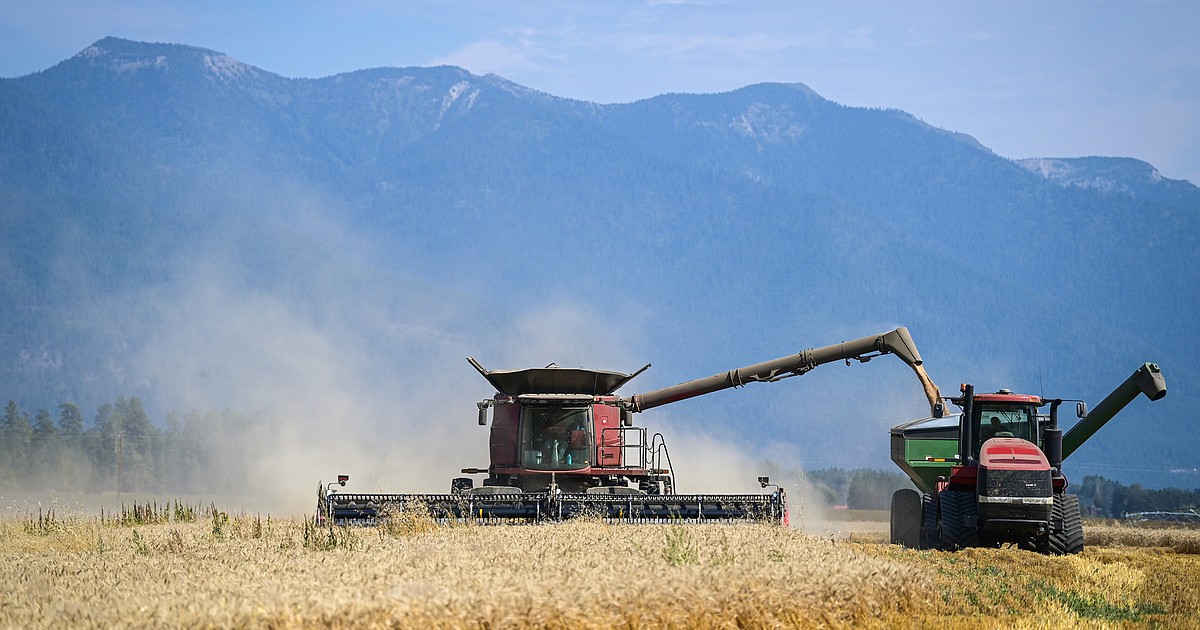
Joining hundreds of other farmers across the country, 14 members of the Montana Farmers Union joined the organization’s legislative fly-in earlier this month in Washington, D.C., to voice concerns about a future farm bill even as tariffs take a toll on the agriculture sector.
The annual event comes as farmer advocacy groups across the country are asking the federal government to reauthorize the Farm Bill, which is how the United States has dictated large portions of the country’s agricultural policy. It has not been reauthorized since 2018, though some parts of it were folded into the “Big Beautiful” reconciliation bill, passed without Democratic support earlier this year.
That included a measure that allowed single entities to increase the amount of crop insurance coverage they can get. This essentially allowed large corporations to increase the amount of taxpayer funded insurance subsidies they could get and did not benefit smaller farmers, Montana Farmers Union President Walter Schweitzer said Thursday, because it equated to a cap increase.
Crop insurance is where the majority of Farm Bill money goes, and there are ways to fix it, he added.
A step system could be put in place, for example, that would allow a farmer who needs $1 million in insurance coverage to get a higher percentage of that covered by taxpayers than a corporation that needs $30 million in insurance.
Farmers across the country are advocating for the Farm Bill to be reauthorized, saying not having the certainty of the bill is not conducive to an industry that thrives on stability.
Schweitzer has also heard the criticism, mostly coming from progressive circles, that American farmers voted for President Donald Trump and are therefore getting what they asked for.
“I don’t disagree that there’s farm organizations out there that have been very vocal in support of this administration, but their members are really questioning what they did,” Schweitzer said. “I’ve got farmers who are calling me from these other farm organizations that are freaking out about the tariffs.”
Those tariffs continue to be a major concern, Schweitzer said, because it has caused some countries to simply buy agricultural products from other countries.
Schweitzer is also a supporter for rural mental health care and said stress is impacting those working in the industry. He’s lost several friends this year, all farmers and ranchers, to suicide, he said.
He also sees the general economic situation around American agriculture to be deeply troubling, drawing comparisons to the 1980s Farm Crisis.
“In the ‘80s, we weren’t pissing off our customers, we just made some really bad financial decisions in our ag policies,” Schweitzer said. “But now we’re not only making bad decisions on ag policy, but we’re pissing off all our customers, and our standing in the world is diminishing drastically every second.”
Farmers Union members also are pushing labeling on food, indicating what country it came from as well as what’s called “Right to Repair” legislation, which would allow people to buy parts and repair their own equipment, something that is not always possible.
The other major, ongoing issue related to tariffs, Schweitzer said, is that farmers are not finding places to sell their products. China, which bought $12.3 billion in soybeans last year, has not bought any this year, the New York Times reported.
“Even if we get past this current trade war, even if we get past this current economic situation, I don’t see a very bright future for American agriculture as we need those markets, and we’re going to struggle to get them back worldwide,” Schweitzer said. “Global buyers are going to buy from us as a last resort from here on out.”
Outside Sidney, Sarah Degn is watching the soybean issue play out in front of her.
“Things like the trade war are really hitting home this time of year,” Degn said. “I mean, I’m going to start combining soybeans tomorrow, and I’m not totally sure what’s happening with all of them yet.”
Sidney lost its sugar beet factory several years ago, which prompted a change for farmers in the area. Degn, a member of the Montana Farmers Union, was in the nation’s capital during the fly-in.
“You feel like when you talk to these people and they’re listening and their staff are listening, and you’ve made progress, and then you hear the people at the top say, well, until the president says it’s OK, we can’t do anything,” Degn said. “So you get the feeling they want to help, but they’re waiting for permission.”
Representatives from the Montana Farmers Union met with members of the state’s all-Republican delegation, including U.S. Reps. Ryan Zinke and Troy Downing. Schweitzer said Rep. Downing and Sen. Tim Sheehy were receptive to more legislation around food packaging.
The Farmers Union is pushing for clearer packaging on meat products, which is called “Country of Origin Labeling” or, COOL.
The problem, Schweitzer said, is that some beef raised in other countries is then processed in America, letting those companies slap a United States label on the beef. Regulations on beef differ from the U.S. in other meat-producing countries like Brazil and Mexico.
Quality beef has long been a hallmark of American beef production and while products from other countries would likely be cheaper than domestic meat, Schweitzer thinks the customer will be able to taste the difference.
“I am convinced that they may buy that package one or two times, or they may buy that with they’re pinching pennies and don’t have enough money to buy other products,” Schweitzer said. “But there’s no doubt in my mind, given the choice, they would always prefer to buy beef.”
The labeling push echoes some state legislation discussed during the past session, including a “checkoff” bill that would have created a program to market Montana beef. A similar program for wheat already exists.
Montana Farmers Union priorities are driven by its members and the organization’s annual convention — where that policy is set — on Oct. 31 to Nov.1 in Lewistown.



